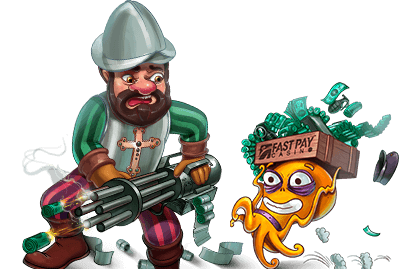Last Updated: Saturday, 07 February 2026 17:41
The history of gambling
"Man only plays when he is in the full sense of the word man, and he is fully human only when he plays." (Schiller)
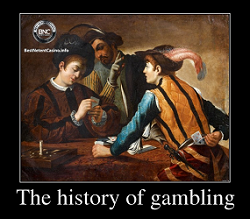
It is considered that the ancient man appeared on the historical scene about 700,000 years ago, at the end of the era of the late Pleistocene. And although some exciting findings in the field of palaeontology pushed that date to 2.4 - 1.5 million years, it makes a little difference in our study. Through his wild life caring for their daily bread, our caveman ancestor could well be faced with the concept of "case" during the hunt. Being able to adjust the snare, he could not be sure that it will fall in some the production.
Case and Chance in the ancient world
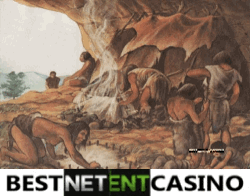
All human life from the cradle to the grave consists of chances, risks, expectations and interest rates. We are unable to predict exactly how a particular action will be reflected in our future life. We can only "faith and hope." That's just luck, unfortunately, doesn`t indulge sensible and prudent. Therefore, no one expects that fate will be true to them. Otherwise, they would have stopped having children, whose future in the modern world is unfortunate; drinking would cause a taxi instead of themselves to get behind the wheel. Sober would always respect traffic rules in place that would be worn at breakneck speed on rough roads; and the elections would vote for people faded, dull, temperate and trustworthy, not the false and cheeky speculators. In reality, most of us live today and do not believe in such passing values as "that the road was easy," or risk in a significant way, choosing the throne of the new Duce. How is the history of the origin and gambling man?
Leading psychologists of our time believe that the basis of self-preservation instinct Homo sapiens is his gambling. The question of the nature of passion and its role in the history of human civilisation can be found here, but for now, we accept this statement as an axiom. Let's see how it works: the survival instinct - the struggle for supremacy - proof of the superiority (competition) - and at the heart of the excitement of the race. Historical chronicles confirm that way; people are playing games since ancient times. So, began the history of the emergence of gambling.
Religious Rites
"Man - Toy God. This - and then to follow. We must live by playing "Plato

Sacrifice
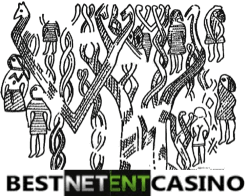
Over time, the ceremony of "conspiracy of Fortune" was the subject of people`s daily lives and the emergence of the prototypes began the gambling. They help to determined how to divide the booty or who will have the most beautiful woman. Later the gambling finally became isolated and turned into a profitable business, where players make bets based only on financial gain.
The emergence of attributes
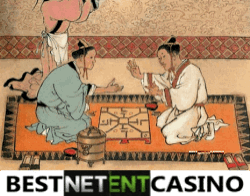
Dice
As well as the emergence of the gambling occurred from religious rituals, the inherent attributes of its predecessors had items used in these rituals: stones, bones of animals and birds, shells, sticks and so on. For example, modern dice are the direct descendants of the small bones of the joints of sheep (arm bones). Tali (the ancient Greeks called them and the game in which they used "astragals") had four broad, flat surface and two narrow and rounded. On all sides of the bones put labels indicating their dignity. The larger the area of the parties, the higher the chance that you'll roll would fall on him, and the less it's usefulness. Very little importance was wide concave side, and the highest possible price 6 had the narrowest side with a smaller plane and convex edges.
Game rules prescribed roll the dice on two or three pieces. The aim would be to dial when throwing the maximum number of points or as close as possible or exceeds a particular value. Later, these were replaced by bone cubes (cube and pyramid-shaped) made of ivory, amber, stone, wood, teeth of various animals, fish and humans. The most widely used six-sided dice with the symmetric cubic shape that provides more uncertainty in the results obtained by the cast. Archaeologists have discovered the bones of those in Mesopotamia (age 5000 years) and Egypt (age 4000 years). So, there was the emergence of the gambling form, close to the modern.
Playing cards
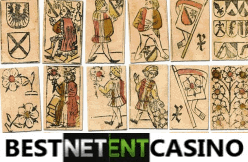
Tape Measure
Roulette. That is one of the most mysterious gambling. For many centuries, it continues to keep players on their toes, and the simplicity of the rules makes it possible to start the game from the first minutes after they met. However, experienced players say that roulette is one of the most challenging games that are present in the casino. The history of gambling roulette is fascinating and rich in various versions. Learn more about the history and evolution of the roulette gambling on the next page:
Conclusion
One common origin unites ancient gambling civilisations. They are all associated with higher, unknown, all-powerful and mysterious forces. The game symbolised the whole life of the man from birth to death, and sometimes after it. So, in Egyptian tombs are the images of the deceased person employed by the gambling. The Egyptians believed that the deceased, playing, recreates a new life and they revived it. The motives of the death and rebirth on the board are present in the legends of India, Iceland and North America. Often, the playing field or an analogue board is the sacred altar. Throughout human history is a concept of "divine" and "gambling" go together, and they are the reflection of the phenomena of a single plan.
Where to play?
- We recommend you play at the best gambling site - Fastpay casino. Their VIP loyalty bonus program and perfect customer care will satisfy even the most capricious one of you.

